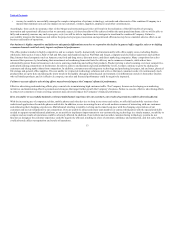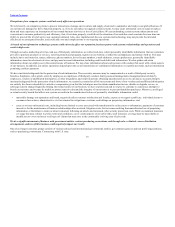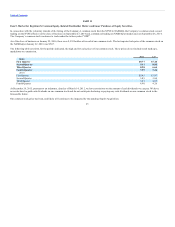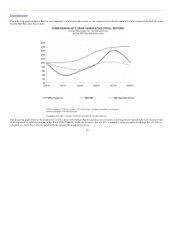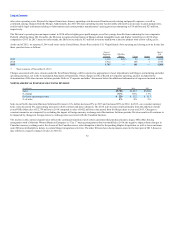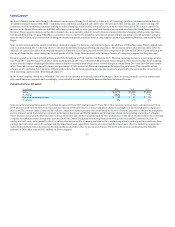OfficeMax 2015 Annual Report Download - page 25
Download and view the complete annual report
Please find page 25 of the 2015 OfficeMax annual report below. You can navigate through the pages in the report by either clicking on the pages listed below, or by using the keyword search tool below to find specific information within the annual report.
Table of Contents
The Company is involved in litigation arising in the normal course of business. While, from time to time, claims are asserted that make demands for a large
sum of money (including, from time to time, actions which are asserted to be maintainable as class action suits), the Company does not believe that
contingent liabilities related to these matters (including the matters discussed below), either individually or in the aggregate, will materially affect the
Company’s financial position, results of operations or cash flows.
On February 4, 2015, Staples and Office Depot entered into the Staples Merger Agreement under which the companies would combine in a stock and cash
transaction. Beginning on February 9, 2015, a number of putative class action lawsuits were filed by purported Office Depot stockholders in the Court of
Chancery of the State of Delaware (“Court”) challenging the transaction and alleging that the defendant companies — Office Depot, Staples, Merger Sub, and
Starboard Value LP — and individual members of Office Depot’s Board of Directors violated applicable laws by breaching their fiduciary duties and/or
aiding and abetting such breaches. The plaintiffs sought, among other things, injunctive relief and rescission, as well as fees and costs. The Court
subsequently consolidated all nine of the Delaware cases and named Jamison Miller and Steve Renous as lead plaintiffs. The consolidated case is named In re
Office Depot, Inc. Stockholders Litigation Consolidated, C.A. No. 10655-CB. After limited discovery, the plaintiffs and defendants agreed on certain
additional disclosures to the Company’s definitive proxy statement filed on May 18, 2015, which were made in a Form 8-K filing on June 5, 2015, and the
plaintiffs withdrew from the calendar their planned motion to preliminarily enjoin the stockholder vote on the merger. On September 18, 2015, the Delaware
Court of Chancery approved a stipulation under which lead plaintiffs voluntarily dismissed the action with prejudice as to themselves and without prejudice
as to the putative class members. The Court retained jurisdiction solely for the purpose of adjudicating lead plaintiffs’ counsel’s anticipated application for
an award of attorneys’ fees and reimbursement expenses in connection with the disclosures in the June 5, 2015 Form 8-K. The Company subsequently agreed
to pay $0.5 million to plaintiffs’ counsel for attorneys’ fees and expenses in full satisfaction of their claim for attorneys’ fees and expenses in the action.
Additionally, in February 2015, two lawsuits were filed in Palm Beach County Circuit Court, namely Keny Petit-Frere v. Office Depot, Inc., et al. and John
Sweatman v. Office Depot, Inc., et al. making the same allegations as in the Delaware actions. The lawsuits generally sought injunctive relief enjoining the
consummation of the transaction, rescission of the transaction in the event it is consummated, damages, fees, costs, and other remedies. Office Depot filed a
motion to dismiss the Florida lawsuits for improper venue, and that motion was granted on May 15, 2015.
In addition, in the ordinary course of business, sales to and transactions with government customers may be subject to lawsuits, investigations, audits and
review by governmental authorities and regulatory agencies, with which the Company cooperates. Many of these lawsuits, investigations, audits and reviews
are resolved without material impact to the Company. While claims in these matters may at times assert large demands, the Company does not believe that
contingent liabilities related to these matters, either individually or in the aggregate, will materially affect its financial position, results of operations or cash
flows.
In addition to the foregoing, Heitzenrater v. OfficeMax North America, Inc., et al. was filed in the United States District Court for the Western District of New
York in September 2012 as a putative class action alleging violations of the Fair Labor Standards Act and New York Labor Law. The complaint alleges that
OfficeMax misclassified its assistant store managers (“ASMs”) as exempt employees. OfficeMax vigorously defended itself in this lawsuit and in November
2015 reached a settlement in the amount of $3.5 million which the court preliminarily approved on November 23, 2015. Final settlement approval and
dismissal of the case are expected by mid-2016.
Further, Kyle Rivet v. Office Depot, Inc., formerly known as Constance Gibbons v. Office Depot, Inc., a putative class action that was instituted in May 2012,
is pending in the United States District Court for the District of New Jersey. The complaint alleges that Office Depot’s use of the fluctuating workweek (FWW)
method of pay was unlawful because Office Depot failed to pay a fixed weekly salary and failed to provide its ASMs with a clear
23


